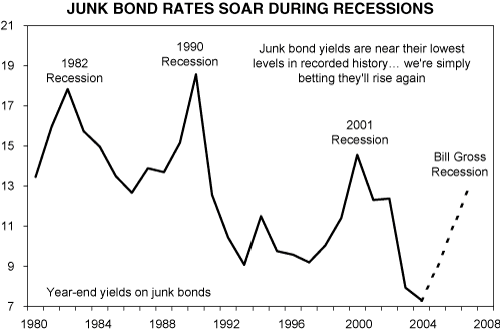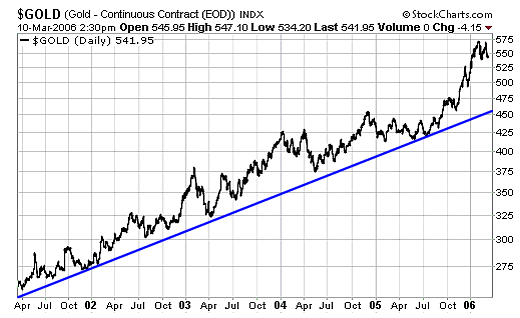| Home | About Us | Resources | Archive | Free Reports | Market Window |
An Almost Inevitable, 99% Unavoidable, Slam DunkBy
Wednesday, March 15, 2006
A half-trillion dollars... That's what Bill Gross is responsible for. Why is he entrusted with managing a half-trillion dollars? It's simple... Bill Gross has delivered double-digit annual returns in bonds for over three decades. He's the best bond manager in the world. That's why they call him The Bond King. So when Bill Gross comes out with a call that is "almost inevitable" and "99% unavoidable," as he did in a recent market commentary, we have to take notice. If Bill is that confident, then we've got to think about adjusting our portfolios for this almost inevitable situation... and we've got to figure out how to best profit from it. Today, I’ll explain the situation, and then offer up what I consider to be the lowest risk, highest reward play on the inevitable. It’s an investment that practically nobody else has bought before, with extremely limited downside. What's "almost inevitable?" According to Bill Gross, it's 1) a housing bust followed by 2) a weakening U.S. economy. In his own words: "Make no mistake about it, the froth in the U.S. housing market is about to lose its effervescence; the bubble is about to become less bubbly. If real housing prices decline in the U.S. in 2006 or 2007, a recession is nearly inevitable." Bill outlines the sequence he sees. It goes something like this: 1. First, housing prices fall. According to Bill Gross, home prices will stop their rise when Greenspan's higher interest rates start to be a burden on first-time homebuyers. Gross then expects banks to tighten their lending standards. At this point, speculators will finally"sniff the beginning of the end"of the housing boom, as Gross says, and that'll be it. Look, you've got to expect it. Real estate booms, and real estate busts. Always has, always will. 2. After the boom ends, people will stop taking equity out of their homes, which will push the economy towards a recession. Bill Gross calls it the "house ATM." As the value their homes have risen, people have refinanced or cashed out some of that value in the form of home-equity loans. They then use the cash to upgrade their existing homes, buy cars, or even make a down payment on a second home. All that ends when the home-price boom ends. The "house ATM" runs dry. And that means no more big trips to Home Depot or Lowe's. No more new cars. And no more second home buying. Our "paper prosperity" -- the increase in our wealth on paper -- is gone. So... how do we make money on this “almost inevitability”? The key for maximum profit and minimum risk is to find a place where everyone else hasn't already placed their chips. There are a lot of options. We could bet against homebuilders or retailers, but my vote is for the one that nobody else is thinking about... where our risk of losing money if we're wrong is low, but our potential for making money is high if we’re right. If the economy tips toward recession, then more people and more companies start to default on their loans. Which loans are most vulnerable to default? Junk loans, of course... loans to the highest risk borrowers. Ah ha! Here we go... the chart below tells the story:
Right now, interest rates on junk bonds are near their lowest levels in their recorded history, at around 8%. I find this amazing... people are willing to accept a measly 8% interest on loans from extremely risky borrowers -- borrowers who may end up defaulting on their loans. What this tells us is that investors are not afraid of default today. There's good reason for that. With the exception of the blip of a recession in 2001, we've had relatively good economic times for nearly 15 years now. But rainy days do come. We simply need to make a bet that the rain will come some day. We need to buy the Access Flex Bear High Yield Fund (AFBIX). The Access Flex Bear High Yield Fund is the single-best way for individual investors to bet against the high-yield market. This fund was introduced less than a year ago. Before it existed, there really wasn't a way for you and me to do it. This fund is pretty darn innovative... It doesn't short junk bonds. Instead, it gets inverse exposure to the junk bond market through things called Credit Default Swaps (CDS). CDSs are something that institutional investors use as insurance against defaults. Access Flex Bear buys these CDS instruments for a basket of 100 junk bonds. When corporate defaults rise, the price of insuring against defaults rises. So if corporate defaults rise, then the value of this fund will go up. Said another way, insurance is cheap now, as nobody expects defaults. We want to buy low, and sell high, so we'll sell in the midst of recession. It sounds complicated. But it's the right move now... to bet on Bill’s 99% slam-dunk. Good investing, Steve Market NotesA QUICK THOUGHT ON THE PRICE OF GOLD When DailyWealth looks at a multi-year price chart of gold, we see an asset that has reached for the sky and seized it… and we are worried. We are long-term bulls on gold. We would not be surprised to see gold resume its steady march upwards in price. However, we would also not be surprised to see gold experience a large short-term price drop. We know many of the “hot money” hedge funds are sitting on large profits from the recent price surge… and those funds can quickly sell off their holdings to collect their profits. This selling could cause more selling, and from there, it’s anybody’s guess. If this type of move were to happen, we would not surprised to see gold trade all the way down to $475 an ounce. As the chart below shows, even a drastic move down below $500 an ounce would still leave gold’s bull market intact (that’s probably when we would buy more). The past 5 years in gold (trend line in blue):
-Brian Hunt |
Recent Articles
|



